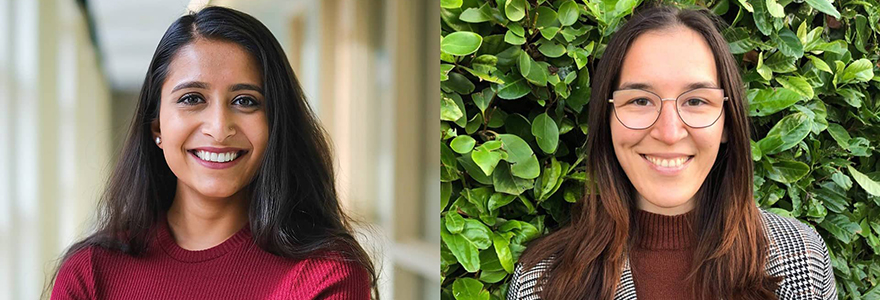Educational Excellence: MD+, a medical education innovation

Medical students Shaily Brahmbhatt and Jelena Poleksic both came to the Schulich School of Medicine & Dentistry with a desire to integrate external or adjacent interests into their learning and future practice.
They’re now embracing that opportunity as the first participants of Schulich Medicine’s MD+ Track.
The Track provides students with the time, financial and academic support to pursue professional and graduate training while completing their medical degree. It also allows students to tailor their learning to their interests.
Brahmbhatt aspires to one day work in paediatric surgery but her passion to improve Indigenous and rural access to care has her also pursing her Master’s in Public Health (MPH). Poleksic has an evolving interest in mental health, and is fascinated by the history of medicine, the focus of her graduate training abroad.
“MD+ is a student-focused strategic opportunity we created after listening to our students,” said Dr. John Yoo, dean of Schulich Medicine & Dentistry. “We are giving them an opportunity to pursue a highly individualized approach to their education, with new options to explore interdisciplinary learning that will support their future success.”
A goal in the School’s recently launched Strategic Plan, MD+ augments the exemplary clinical training students already receive at Schulich Medicine & Dentistry. It offers four different pathways to pursue in a wide variety of subjects. These include basic sciences, the history of medicine, public health, global health management, space studies, music performance and business, with additional programs being developed.
“I know how difficult it is to pursue additional training during and after residency,” Yoo said. “We wanted to create a construct that reduces those challenges, while broadening new possibilities for our students.”
Learning from peers
Shaily Brahmbhatt
Brahmbhatt looked to Western’s MPH program “to be pushed out of my comfort zone,” she said. Her hope was realized just a few weeks into the course.
“I’ve had to shift my perception of what a ‘right answer’ looks like or how to think about complex problems from a different framework,” Brahmbhatt said.
She credits that change in thinking to working on case studies with peers, who include doctors, nurses, public health professionals and those coming straight from completing their undergraduate degree.
“Most of my learning happens with my learning team,” Brahmbhatt said. “We’ll go over a problem and I will have thought of it in a completely different way than someone else. It’s eye-opening to see how our different worldviews and experiences shape how we look at problems. It’s given me an appreciation for the type of diversity I’ll encounter in the real world.”
Brahmbhatt is also embracing this experience as an opportunity to reflect on reconciliation.
“As a settler who has grown up here, there is a lot that I need to learn and unlearn, so I’m using this time to do that without putting the burden on Indigenous students and faculty to educate me,” she said. “Some cases are very helpful in that regard. They focus on Indigenous health and the onus is on us to do the research ourselves.”
“Reconciliation should be every settler’s priority. It’s definitely something I’ve put very high on my list of personal and professional goals.”
Learning from the past
Jelena Poleksic
Not long after starting at Schulich Medicine, Poleksic became involved with Western’s history of medicine unit, winning awards annually at the History of Medicine Days annual conference in Calgary, as well as the Rowntree Prize in Medical History.
During the past three years of her medical education, her published research and leadership efforts concentrated on compassion within health-care settings – an aspect overlooked, historically, particularly around mental health.
“I’m fascinated by the history of psychiatry,” Poleksic said. “It’s so tragic, but so rich at the same time.”
Poleksic has explored the treatment of women with puerperal insanity in Canada, while also focusing on the London Asylum for the Insane, and the actions of its former superintendent, Dr. Richard Maurice Bucke.
Now she has landed in London, England to earn her master’s in the History and Philosophy of Science at University College London (UCL) through the MD+ international pathway.
“University College London has a rich tradition as home of the former Wellcome Trust Centre for the History of Medicine,” Poleksic said.
“The wealth of resources available through the Wellcome Collection and London Science Museum make the opportunity to study in the U.K. and at UCL unparalleled.”
Poleksic looks forward to applying and sharing her broader knowledge when she returns to Western.
“By completing this degree and gaining more experience in the field, I hope to continue facilitating further opportunities for students to engage with this history of medicine. Studying medicine in the midst of a pandemic has reinforced how important it is to see how our predecessors thought, how they dealt with disease, and how to translate these insights into our practice today.”







